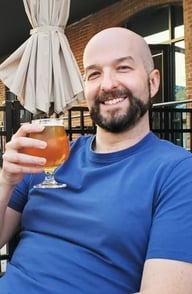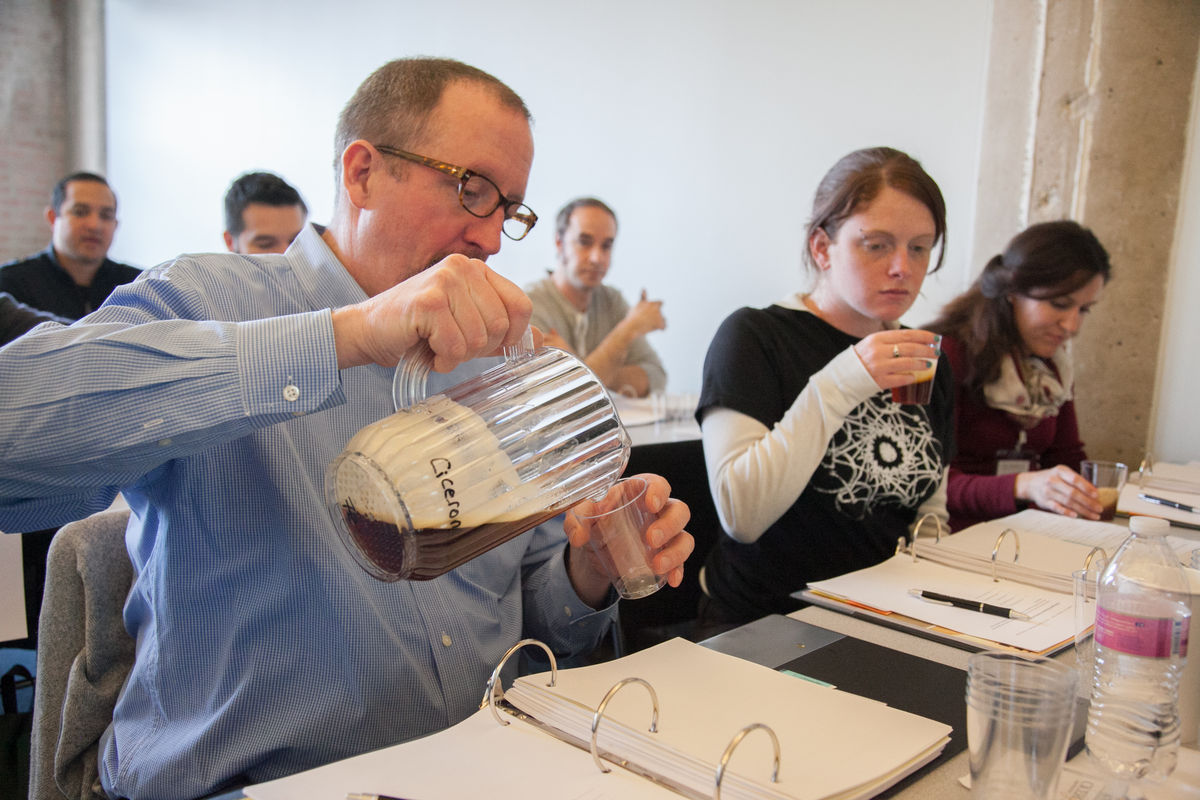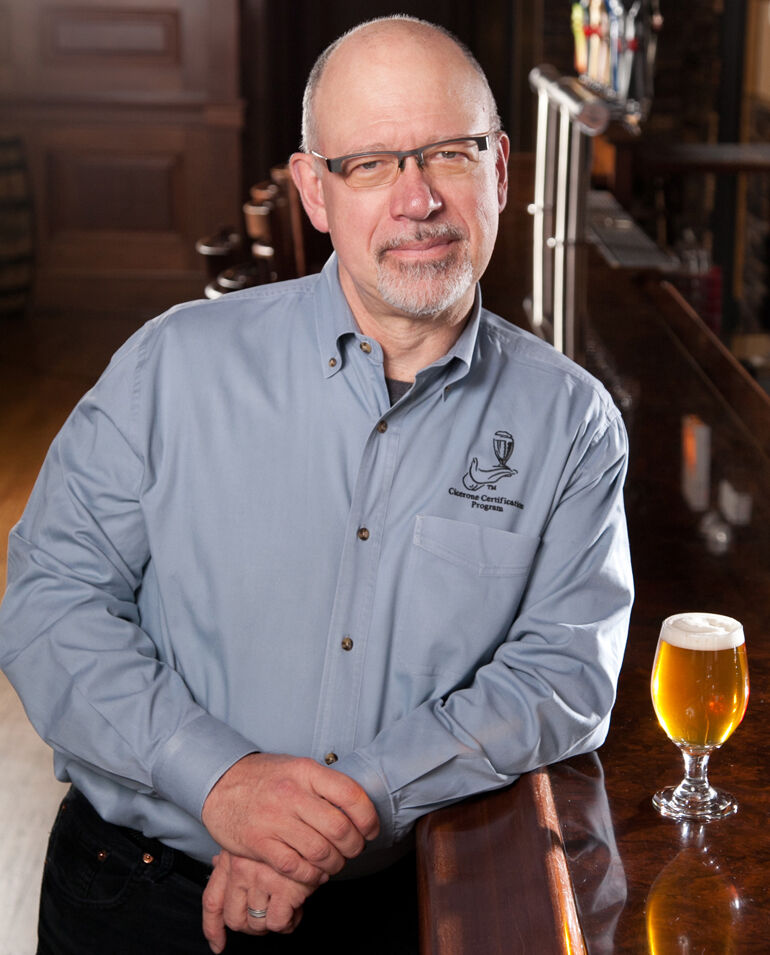Start 14-Day Trial Subscription
*No credit card required

Cicerone Certification Program Celebrates 10 Years
As craft beer has become more and more entrenched in modern cuisine, the way in which craft beer is served and presented in fine establishments has also become something of an art form.
With that mission in mind, the Cicerone Certification Program was founded 10 years ago by Ray Daniels in order to create the craft beer equivalent of a wine sommelier – a popular term in the wine world that conveys a person’s encyclopedic knowledge of selecting, acquiring and serving fine wine.
For the Cicerone (pronounced “sis-uh-rohn”) Certification Program, the expertise and prestige that comes with being a wine sommelier was something that Ray Daniels and company wanted to export to the craft beer world, with a few key components highlighted.
Cicerone is a trademarked title, which designates “hospitality professionals with proven experience in selecting, acquiring and serving today’s wide range of beers.” To become a Cicerone is a painstaking process that involves knowledge of many different beer-related subjects, such as: Keeping & Serving Beer, Beer Styles, Beer Flavor and Evaluation, Beer Ingredients & Brewing Processes and Pairing Beer with Food.
Becoming a Cicerone is a thoroughly prestigious title, as it entails an almost complete understanding of beer from the moment it enters a fermentation tank to its final destination in your vacant tummy.
According to the Cicerone Certification Program’s website, the program encourages continued participation by offering four levels of certification “beginning with the simplest and building to the most complex and demanding.” The four tiers of the Cicerone Certification Program are: Certified Beer Server, Certified Cicerone, Advanced Cicerone (a fairly new tier created in 2015) and Master Cicerone.
We spoke with CCP founder Ray Daniels about the continued success and importance of the program, as well as what the future holds for the organization in 2018 and beyond.
What led you to create the Cicerone Certification Program?
In short, bad beer. In the years before I started working on this idea, I'd been working as Director of Craft Beer Marketing for the Brewers Association. (Julia Herz took over from me and still holds that position.)
In that role, I traveled a lot and drank American craft beer in many different places. What I noticed was that many places didn't know a thing about the beers they were pouring and worse yet, many places were ruining those beers with improper storage, poor draft system operation or inadequate line cleaning.
At one point I thought, "Somebody should do something to improve the quality of beer and beer service that consumers receive.” That was the ultimate goal when I started, and it played a big role in how I designed the program.
Even in 2007, the whole idea of a "beer sommelier" program was not rocket science. Anyone who had been around the hospitality industry or had any familiarity with the wine world and then saw what was going on with beer could have thought of creating such a thing. Indeed, when I started the program there were many people already using the term beer sommelier.
A couple of things made my vision for the Cicerone program unique. First, when I asked people in the industry what we should call a "beer sommelier" program, a lot of them told me that they didn't care just as long as it wasn't "beer sommelier"! These folks didn't want beer experts to be known by a wine term. They really wanted beer experts to have a unique title. And one of the problems with that term (beer sommelier) is that it leads you down a path of treating beer service the same way that sommeliers treat wine service. That, I knew from early on, was not going to work.
Beer was its own beverage and it needed to be attended to and served in ways that were unique to, and appropriate for, beer. As a result, I purposely avoided looking at the wine sommelier program during development of the Cicerone program. I didn't even go look at their website until we'd been in business for six or seven years.
When did you realize that the CCP was a success?
It came in steps, of course, but I’d say there were two key times. In August of 2009, I remember flipping through my calendar and when I looked at the page for January of 2010 – just four months away – I said to myself, "Well, I wonder who I'll be working for then." After 20 months of operation and despite a lot of positive feedback, I'd just about reached the end of my ability to fund the program without an outside job. I had no intention of giving up on the program, but I did think that it might have to take a back seat to some other work. But that autumn, things took off.
Brewers and distributors began to participate in the program at a growing pace. By the time January rolled around things had changed completely: Instead of looking for a job, I hired my first part-time employee. By August of 2010, that employee was full-time and we had moved operations from my condo to rented office space a few blocks away. What a difference a year makes!
The second big milestone for me came a few years later. We were in our second, larger office quarters and the employee group had grown to four full-time folks (including me). In February 2012, we passed an important milestone when we reached 10,000 Certified Beer Servers. That number felt substantial, and honestly, very special. At that point, I figured that Cicerone had earned a place in the beer industry and that it was unlikely to go away any time soon.

To become a Cicerone is a painstaking process that involves knowledge of many different beer-related subjects, such as: Keeping & Serving Beer, Beer Styles, Beer Flavor and Evaluation, Beer Ingredients & Brewing Processes and Pairing Beer with Food.
How does it feel during the 10th anniversary of the CCP's creation?
In most ways it feels like just another day. We are still spreading the word of good beer and trying to help people learn more about the beverage we love and how to serve it properly.
Of course, it is personally satisfying to know that I finally did the right thing at the right time. I first started organizing beer events in 1991 – initially on behalf of the Chicago Beer Society. But in 1996, I started the Chicago Real Ale Festival, which was my own venture. Over the seven years that I ran that event, it became sort of a cult favorite among beer folks, but it never made any money. I had also tried to start a brewery in the 1990s and did some education things that I once hoped would pay the rent, but none of those ideas ever turned into a successful venture. In the 2000s I found a home with the Brewers Association, and as I had for Chicago Beer Society, I initiated a number of successful programs there – but of course that’s all not-for-profit work so success looks somewhat different.
When I started the Cicerone Certification Program, I had no idea if it would even work. I certainly never imagined that we’d see the level of success that has come to the program over the years. But it is nice to know that after all the things I’ve tried and the nearly 20 years of successful programs I’ve created for other organizations, I finally hit on something that worked when I was the one responsible for every aspect of it.
How quickly has the CCP's membership grown over the years?
We don’t have a “membership” per se, but the number of certifications awarded went through big years of double-digit growth between 2012 and 2015. The great thing is that the overall number of people getting certified each year has remained steady even as growth in the craft beer industry has slowed. Even with our international efforts, U.S. certifications still account for nearly 90 percent of our total.

"When I started the Cicerone Certification Program, I had no idea if it would even work. I certainly never imagined that we’d see the level of success that has come to the program over the years." - Ray Daniels, Cicerone Certification Program founder
Why was the Advanced Cicerone stratum created?
A lot of reasons, really. It was a very complex decision – one that we could really spend hours discussing. But let me see if I can quickly describe the key reasons. First, a few people had told us over the years that there should be an intermediate level between Certified Cicerone and Master Cicerone. We actually didn’t want to create a new level (it is a lot of work!) and there was no reason to do so in the early days.
When demand skyrocketed for the Master exam starting in 2013, we reached a point where we felt we weren’t serving the interests of our certification holders adequately. Indeed, one of the key turning points was when Patrick Rue (founder of The Bruery) passed the Master Cicerone exam, he said during his results phone call with me that the jump was too big; there should be an intermediate level. That got my attention.
By adding the Advanced Cicerone exams, we now offer Certified Cicerones a chance to move to a new level under much more favorable conditions. The Advanced exam takes just one day to complete, and we offer them far more frequently and in a much wider range of locations. Also, if you don’t pass in your initial session, you can retake just the written or just the tasting to bring your score up to the passing level. All of this makes advancement much more accessible for Certified Cicerones than when the two-day Master Cicerone exam (given only in Chicago) was the only option.
Another benefit of this approach is that candidates taking the Master exam will have already demonstrated their capability to pass an exam with a similar structure covering advanced knowledge and skills. And for us, because we use some well-known industry experts to administer oral exams at the Master level, we feel a lot better knowing that everyone taking that exam is going to be worthy of that examiner’s time and attention. We didn’t always feel that was the case before we instituted the Advanced exam.
Two years into it, we’re pleased with the way it has worked out. In that time, nearly twice as many people (68) have passed the Advanced exam than have even taken the Master exam. I think that clearly demonstrates that a lot of people really wanted the opportunity that the Advanced Cicerone exam offers.

Potential Cicerones attempt to complete an exam to become a part of the Cicerone Certification Program.
How many new Cicerones do you see joining CCP's ranks in the upcoming years?
I’ve always believed in letting the program develop organically rather than trying to force it to grow at a certain rate. We believe that the program has its greatest value when organizations undertake it at a point when they have come to believe they need it rather than when we want them to do it. That said, we hope to continue with modest growth in the U.S. and to see significant gains in the international business in coming years.

Interested in becoming a Cicerone? Visit the program website here.



